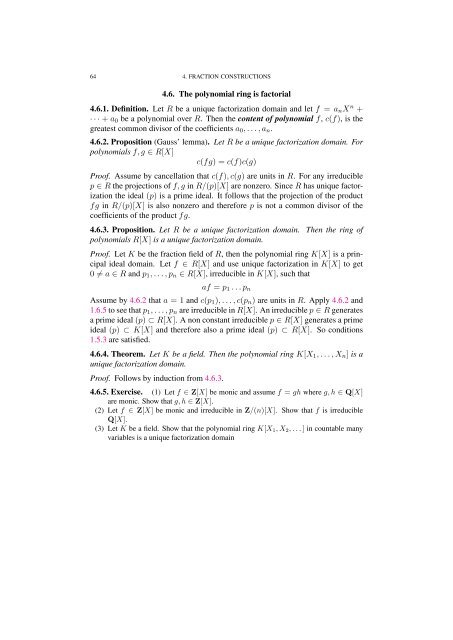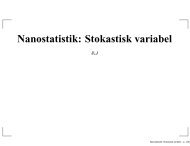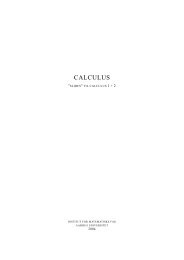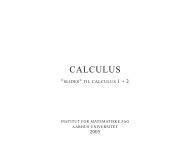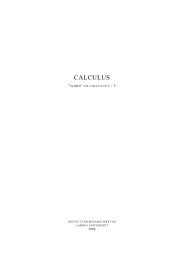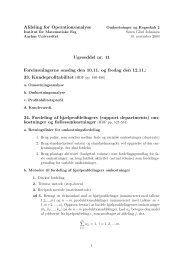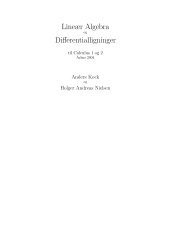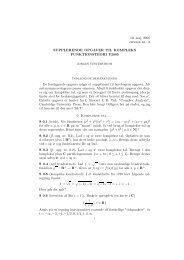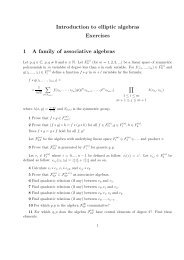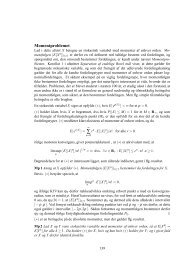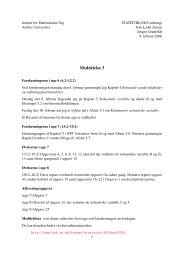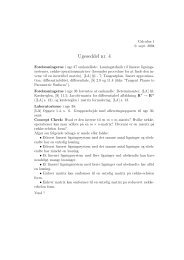Commutative algebra - Department of Mathematical Sciences - old ...
Commutative algebra - Department of Mathematical Sciences - old ...
Commutative algebra - Department of Mathematical Sciences - old ...
You also want an ePaper? Increase the reach of your titles
YUMPU automatically turns print PDFs into web optimized ePapers that Google loves.
64 4. FRACTION CONSTRUCTIONS<br />
4.6. The polynomial ring is factorial<br />
4.6.1. Definition. Let R be a unique factorization domain and let f = anX n +<br />
· · · + a0 be a polynomial over R. Then the content <strong>of</strong> polynomial f, c(f), is the<br />
greatest common divisor <strong>of</strong> the coefficients a0, . . . , an.<br />
4.6.2. Proposition (Gauss’ lemma). Let R be a unique factorization domain. For<br />
polynomials f, g ∈ R[X]<br />
c(fg) = c(f)c(g)<br />
Pro<strong>of</strong>. Assume by cancellation that c(f), c(g) are units in R. For any irreducible<br />
p ∈ R the projections <strong>of</strong> f, g in R/(p)[X] are nonzero. Since R has unique factorization<br />
the ideal (p) is a prime ideal. It follows that the projection <strong>of</strong> the product<br />
fg in R/(p)[X] is also nonzero and therefore p is not a common divisor <strong>of</strong> the<br />
coefficients <strong>of</strong> the product fg.<br />
4.6.3. Proposition. Let R be a unique factorization domain. Then the ring <strong>of</strong><br />
polynomials R[X] is a unique factorization domain.<br />
Pro<strong>of</strong>. Let K be the fraction field <strong>of</strong> R, then the polynomial ring K[X] is a principal<br />
ideal domain. Let f ∈ R[X] and use unique factorization in K[X] to get<br />
0 = a ∈ R and p1, . . . , pn ∈ R[X], irreducible in K[X], such that<br />
af = p1 . . . pn<br />
Assume by 4.6.2 that a = 1 and c(p1), . . . , c(pn) are units in R. Apply 4.6.2 and<br />
1.6.5 to see that p1, . . . , pn are irreducible in R[X]. An irreducible p ∈ R generates<br />
a prime ideal (p) ⊂ R[X]. A non constant irreducible p ∈ R[X] generates a prime<br />
ideal (p) ⊂ K[X] and therefore also a prime ideal (p) ⊂ R[X]. So conditions<br />
1.5.3 are satisfied.<br />
4.6.4. Theorem. Let K be a field. Then the polynomial ring K[X1, . . . , Xn] is a<br />
unique factorization domain.<br />
Pro<strong>of</strong>. Follows by induction from 4.6.3.<br />
4.6.5. Exercise. (1) Let f ∈ Z[X] be monic and assume f = gh where g, h ∈ Q[X]<br />
are monic. Show that g, h ∈ Z[X].<br />
(2) Let f ∈ Z[X] be monic and irreducible in Z/(n)[X]. Show that f is irreducible<br />
Q[X].<br />
(3) Let K be a field. Show that the polynomial ring K[X1, X2, . . . ] in countable many<br />
variables is a unique factorization domain


